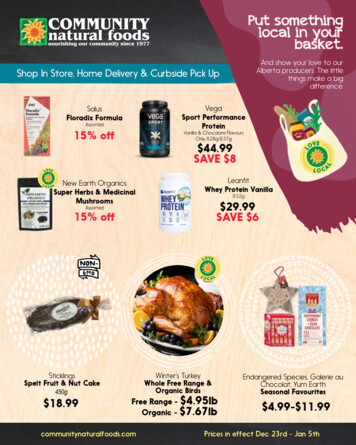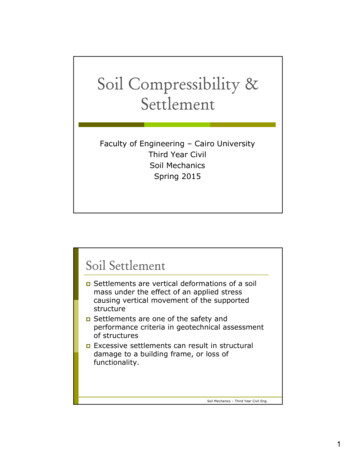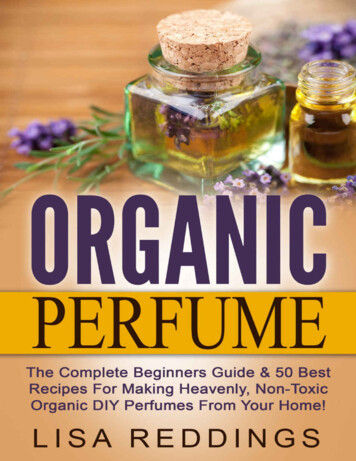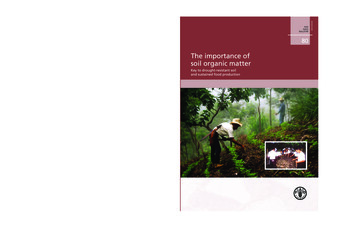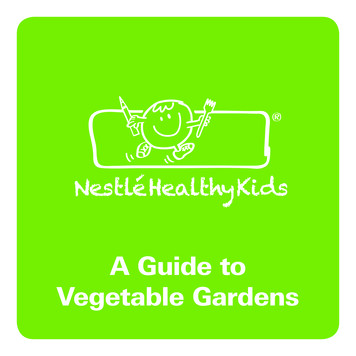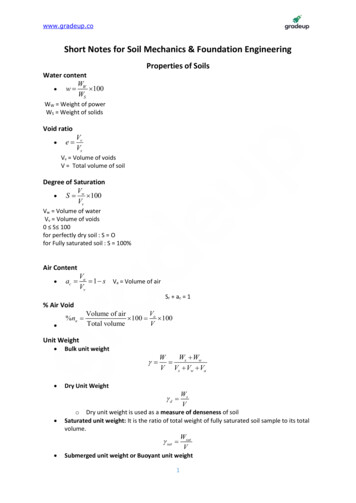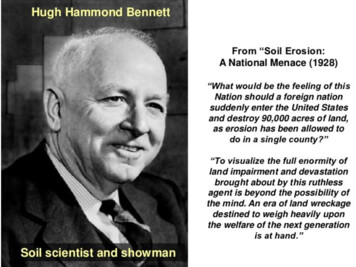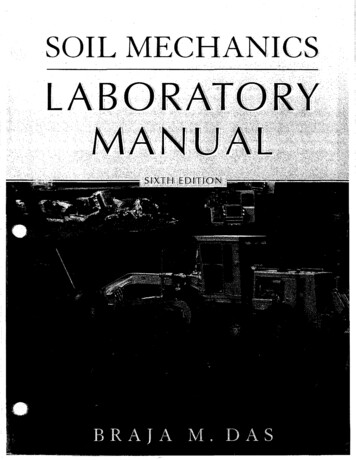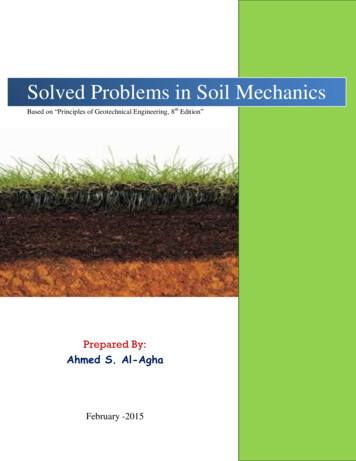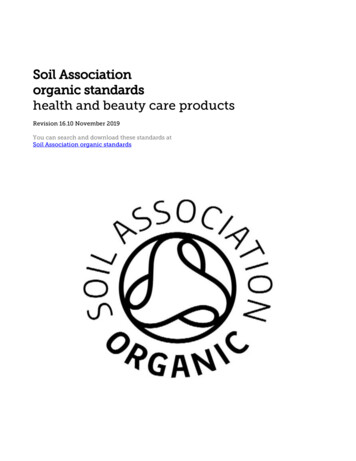
Transcription
Soil Associationorganic standardshealth and beauty care productsRevision 16.10 November 2019You can search and download these standards atSoil Association organic standards
SOIL ASSOCIATION ORGANIC STANDARDS NOVEMBER 2019ContentsContents . 240 Processes in the chain between farm and consumer . 340.1 Who these standards apply to . 440.2 Principles of organic food processing. 540.3 Do you need to be certified?. 740.5 Importing. 1040.6 Record keeping . 1840.7 Genetic engineering and nanotechnology .2040.8 Composition . 2240.9 Approving products . 3440.10 Labelling. 3441 Manufacturing . 4341.1 General requirements .4441.2 Processing .4641.3 Plant and equipment .4941.4 Incoming goods .5041.5 Storage and warehousing . 5141.6 Packaging. 5141.7 Transport . 5441.8 Cleaning and hygiene . 5541.9 Pest control . 5750 Health and beauty care products . 6250.1 What these standards apply to . 6350.2 Principles .6450.3 Raw materials and ingredients .6450.4 Extracting and preserving raw materials . 7050.5 Physical and chemical processing of ingredients . 7350.6 Labelling and composition. 7650.7 Inspection and certification . 7851 Specific health and beauty care products . 795.1.1 Supplements and medicines . 8051.2 Products with a mineral content above 30%. 8151.3 Propellant products. 8151.4 Skin creams.8251.5 Wet wipes .8251.6 Water based products .8251.7 Household products and candles . 832
SOIL ASSOCIATION ORGANIC STANDARDS NOVEMBER 201940 Processes in the chain between farm and consumerStandards you must read with this chapter:Chapter 5.2 PrinciplesChapter 5.3 Becoming Soil Association certifiedChapter 41. ManufacturingChapters 5.2 and 5.3 can be found in our Food and Drink Standards.Processes in the chain between farm and consumer40.1 Who these standards apply to40.2 Principles of organic food processing40.3 Do you need to be certified?40.5 Importing40.6 Record keeping40.7 Genetic engineering and nanotechnology40.8 Composition40.9 Approving products40.10 Labelling3
SOIL ASSOCIATION ORGANIC STANDARDS NOVEMBER 201940.1 Who these standards apply to40.1.1These standards apply after organic foods leave the farm. They apply, for example, to: storage and warehouse units food manufacturers and food importers on-farm processors and packers seed processors packers and wholesalers retailers who process, pack or label their food, and caterers and restaurants, if you wish to use our Soil Association symbol.4
SOIL ASSOCIATION ORGANIC STANDARDS NOVEMBER 201940.2 Principles of organic food processing40.2.1In addition to the principles in chapter 5.2 we have defined more detailed principles of organic foodprocessing. These principles reflect our underlying philosophy and set out the ideal to strive for.They guide our standards and should also guide your manufacturing practice.40.2.2Organic foods are wholesome, authentic, unadulterated and of high quality.Note ‘wholesome’ means preferably whole, minimally processed, contributing to positive health ‘authentic’ means honest/genuine food from a known source, not giving a false impressionregarding its nature ‘unadulterated’ means food made using recipes and methods that minimise the use ofadditives and processing aids ‘high quality’ means as good and as nutritious as possible (of its kind).40.2.3Organic foods are not fortified with added artificial nutrients, unless required by law.40.2.4The transformation of organic agricultural raw materials into food is easily traceable and keptseparate from contamination.40.2.5New or novel technologies, ingredients and processes will not be applied automatically to organicfood manufacturing.40.2.6There is no place for genetically modified organisms or their derivatives in organic food.40.2.7Emissions and pollutants are minimised at sites processing organic food and the processing siteenvironment is conserved and respected.40.2.8Organic food packaging and transportation is minimised and environmentally responsible.40.2.9Labelling ensures transparency of information concerning the nature and ingredients of the food.5
SOIL ASSOCIATION ORGANIC STANDARDS NOVEMBER 201940.2.10Social justice and rights and high standards of animal welfare are an integral part of the wholeorganic food production chain.40.2.11You should comply with the UN Convention for Human Rights (www.un.org/rights) and the corestandards of the International Labour Organisation (www.ilo.org). This means you should allow youremployees: the freedom to associatethe right to organise, andthe right to bargain collectively.40.2.12You must not use forced or involuntary labour or child labour that interferes with their education.40.2.13We may withdraw your certification if working conditions in your organic business do not meet legalrequirements or the UN Convention for Human Rights.40.2.14 Deleted June 2018If you have 10 or more employees you must have a policy that ensures you comply with legalrequirements for human rights and labour relations. [Covered by other legislation, particularly EUEmployment laws]6
SOIL ASSOCIATION ORGANIC STANDARDS NOVEMBER 201940.3 Do you need to be certified?40.3.1If you want the products that you make, store or sell to be labelled as organic, you must hold a legalcertificate of registration for that productfrom an organic certifier, such as us.40.3.2You need certification if you manufacture, trade, wholesale, distribute, store, break down, pack,repack, re-label or process organic materials out of sight of the final customer. This includes: wholesaling and storing products only, both packed and loose collecting bulk products from many points, for example milk haulier supplying ingredients to others to process for you catering and food service on-farm processing and packing importing organic raw materials or processed products from outside the EU first consignees of organic raw materials from outside the EU, and seed and animal feed mills.Note – this covers all wholesalers, storage premises, including warehouses and distribution centres.It applies to those storing products in bulk, and those storing products that are already packed andlabelled for the final consumer. However you do not need certification if you sell directly to the endconsumer or user, or are a warehouse owned by or operating under contract to retailers or a storeattached to a retail operation.Standards section 40.4 is no longer relevant7
Guide to using these standardsThe standards are listed in the column on the left, with a white background for EU Organic Regulation standards and a blue backgroundfor Soil Association higher standards. Where necessary, guidance is provided in the column on the right, with a grey background todifferentiate it from the standard. Each standard is referenced with the relevant article/s of the EU Organic Regulation or shows that it is a Soil Association higherstandard. Each Soil Association higher standard has a Why? box to explain its purpose and rationale.RThis symbol shows where you need to keep a record to demonstrate that you are meeting the standard. The specific requirementsfor the records will be detailed in the standard or guidance.IThis symbol shows where additional relevant information is provided.What is guidance?Guidance provides supplementary information to the standards which explains how compliance will be assessed. It tells you where andhow to provide the information required, for example through record keeping or demonstration at your inspection. The guidance mayalso provide examples of actions and measures to help you demonstrate compliance, and links to best practice guides and information.EXAMPLE StandardsEXAMPLE Guidance40.5.8 Receiving imported goods1.The first consignee must check that imported products:a)arrive in appropriate packaging orcontainerswhich prevent substitutionb)identify the exporterc)are marked to identify the lotd)arrive with a COIe)that the COI covers the product in theconsignment.2.Once these checks have been made, the first consigneemust complete box 21 on the COI.3.You must keep records to demonstrate these checks havebeen made.(EC) 889/2008 Art. 31; Art. 33; Art. 34; Art. 66(2)(EC) 1235/2008 Art. 13(9)The relevant part of the EUOrganic Regulation isreferenced hereYou will also need to keep records relating to other areas of youroperation, please refer to the record keeping section (5.7).The R symbol shows whichrecords you need to keep todemonstrate that you meetthis standard
SOIL ASSOCIATION ORGANIC STANDARDS NOVEMBER 2019EXAMPLE Standards40.5.3 Soil Association symbol useIf you wish to use the Soil Association symbol onimported products, whether from the EU or thirdcountries, you will need Soil Association certification inorder to do so.EXAMPLE GuidancePlease refer to standard 5.8.8 for details of the requirements for using theSoil Association symbol.Soil Association higher standardSoil Association higher standardsare clearly shown.Each Soil Association higherstandard has a Why? box to explainits purpose and rationale.Why?The Soil Association symbol is the most recognised organic certification mark in the UK and has gained the trust, respect andconfidence of consumers and producers across the globe. The Soil Association symbol demonstrates that an organic food or non-foodproduct meets our higher standards for animal welfare, health, consumer protection and the protection of the natural environment.9
SOIL ASSOCIATION ORGANIC STANDARDS NOVEMBER 201940.5 ImportingWhat’s this chapter about?This chapter outlines the requirements that need to be met when importing organic goods from outside the UK.Standards40.5.1 ScopeGuidanceThe standards in this section apply to anyoneinvolved in importing organic goods, or acting as thefirst consignee in the import of organic goods. Theyalso apply to anyone carrying out these activities onbehalf of someone else.First consignee means the natural or legal person to whom the importedconsignment is delivered and who will receive it for further preparationand/or marketing.(EC) 889/2008 Art. 81EEA countries are Iceland, Liechtenstein and Norway.40.5.2 Importing products from within the EUYou do not need to be licensed as an importer toimport organic products from within the EU, or theEuropean Economic Area (EEA), provided thoseproducts are certified in accordance with the ECorganic regulations. However, you will still requirecertification to trade, wholesale, distribute, store,break down, pack, repack, re-label or process organicproduct.Refer to standard 5.1.1 for details of which activities require certification.(EC) 834/2007 Art. 34(1)Please refer to standard 5.8.8 for details of the requirements for using the Soil40.5.3 Soil Association symbol useIf you wish to use the Soil Association symbol onimported products, whether from the EU or thirdcountries, you will need Soil Association certificationin order to do so.Association symbol.Soil Association higher standardWhy?The Soil Association symbol is the most recognised organic certification mark in the UK and has gained the trust, respect andconfidence of consumers and producers across the globe. The Soil Association symbol demonstrates that an organic food or non-foodproduct meets our higher standards for animal welfare, health, consumer protection and the protection of the natural environment.10
SOIL ASSOCIATION ORGANIC STANDARDS NOVEMBER 2019Standards40.5.4 Importing products from outside the EUIf you wish to import products from a third country,(outside the EU or EEA) you will need certification inorder to do so.If you use a sub-contractor to import on your behalf,they will also need certification.You will also need certification if you wish to exportyour products.(EC) 834/2007 Art. 28(1)40.5.5 Planning and managing your importingoperationBefore you can begin importing, you must write aplan with a full description of your premises, unitsand activities. This must include:a)Your name and addressb)The location of premises where operationsrelated to importing are carried outc)The nature of your operations and yourproducts.GuidanceImporter means the natural or legal person within the community whopresents a consignment for release for free circulation into the Community,either in person, or through a representative (e.g. a clearing or forwardingagent).The first consignee also needs to be licenced. First consignee means thenatural or legal person to whom the imported consignment is delivered andwho will receive it for further preparation and/or marketing.ITo help you meet this requirement we provide an application form thatoutlines what information is required. This can be found on our website.If you make any significant changes to your activities, you must update yourdocumentation and inform your Certification Officer. Important changes are,for example, change of location of an activity, change of ownership, orchange of contact person. Another important change is alteration of certifiedproduction which means that information previously submitted about theproduction is no longer correct.(EC) 834/2007 Art. 63(3) You must let us know if and when you plan to expand into new areas. For40.5.6 Importing products certified byapproved certifiers or from equivalentcountries outside the EUexample, if you currently store organic products and wish to start packing orprocessing them, if you want to start importing products from outside the EUor if you have an abattoir and you want to start processing burgers andsausages. Depending on what you are adding or expanding, we will need toupdate your certificates and you may need an additional inspection orlicence.The EU publishes lists of approved countries and certification bodies and alsothe categories each is approved for.Recognised third countriesCountries whose national organic standards and control systems arerecognised as equivalent to EU organic standards are known as ‘recognisedthird countries’. A list of countries and approved certification bodies(EC) 834/2007 Art. 32; Art. 33 operating in each country can be found in Annex III of EU Regulation(EC) 1235/2008 Annex III; Annex IV 1235/2008. These countries are:You may import organic products from suppliers,including exporters, certified by a certification bodyrecognised and approved by the EU or a countrywhich has an equivalence agreement with the EU.11
SOIL ASSOCIATION ORGANIC STANDARDS NOVEMBER 2019 ArgentinaAustraliaCanadaChileCosta RicaIndiaIsraelJapanNew ZealandSwitzerlandTunisiaUnited States of AmericaEach country is approved for specific product categories, (see below fordetails). This means not all product types can be imported, for example winefrom Argentina. Before you arrange to import anything from these countriesplease contact your Certification Officer so they can let you know about anyrestrictions.CategoriesYou will often see categories referred to on the organic certificates ofcompanies from outside the EU. These categories indicate the products whichthe company is allowed to export to the EU. Below is what each categorymeans:A: Unprocessed plant productsB: Live animals or unprocessed animal products (includes honey)C: Aquaculture products and seaweedsD: Processed agricultural products for use as foodE: Processed agricultural products for use as animal feedF: Seeds and propagating materialRecognised certification bodiesControl bodies whose standards and control system have been recognised asequivalent to EU organic standards are known as ‘recognised certificationbodies’. Just like recognised third countries, each certification body isapproved for specific product categories. The list of these certification bodiesis in Annex IV of EU Regulation 1235/2008.12
SOIL ASSOCIATION ORGANIC STANDARDS NOVEMBER 2019When obtaining certificates from suppliers certified by recognisedcertification bodies, you will need to check that the documents state that thesupplier is certified to the EU regulation and that they make explicit referenceto regulations 834/2007 and 889/2008. You will also need to check that thescope of the company’s certification includes export.The list of approved certifiers occasionally changes. If you are unsure aboutwhether a prospective supplier is certified by an approved certifier, pleasecontact your Certification Officer and forward them a copy of your supplier’sorganic certificate.Compliant certification bodiesControl body whose standards have been recognised by the EU as compliant.Meaning it follows all aspects of the EU regulation.40.5.7 Certificates of Inspection1. All organic products imported into the EU must beaccompanied by an original endorsed Certificateof Inspection (COI) issued in the third country.2. The endorsed COI must accompany goods to thepremises of first consignee and then must be keptby the importer for at least two years.3. The first consignee or importer (where relevant)can make a copy of the COI in order to fulfil therecord keeping requirements listed in 40.5.11,provided it is printed or stamped ‘COPY’ or‘DUPLICATE’.There currently no countries recognised are as compliant to EU organicregulations.COIs need to be issued and endorsed (signed and stamped in box 14) bythe certification body of the exporter and need to be available at the EUport of entry for further endorsement by the member state authority.Electronic Certification of Inspection for the import of organic products intothe EUCOIs are sometimes referred to as ‘transaction certificates’.The new system of electronic certificate for imports of organic productsbecame compulsory on 20 October 2017. The electronic certificate aims toenhance traceability of imported organic products and reduce potential fraud.It also aims to reduce the administrative burden for operators and authorities,and provides statistical data on organic imports. You can find out more ic-certificate en(EC) 834/2007 Art. 33 Importers, and exporters in the country of origin, must register for a TRACES(EC) 1235/2008 Art. 13 NT account. This is the electronic system used by the European Commissionto issue and monitor all COIs.13
SOIL ASSOCIATION ORGANIC STANDARDS NOVEMBER 2019In the UK, the Port Health Authority (PHA) is responsible for checkingdocumentation of organic produce at the port of arrival. They have theauthority to stop entry of organic product not accompanied by a valid COIand the goods may be held at port or lose their organic status. The PHA checksthat the information on the COI matches with the goods being imported andother documents associated with the shipment e.g. the Airway Bill or Bill ofLanding. If the information is correct they endorse the COI (they completebox 20 on the form) & the goods are allowed to enter the EU as organic.If products are imported without the endorsed COI then the competentauthority will not allow them to be endorsed retrospectively. If you do nothave an endorsed COI for each consignment, the product may lose its organicstatus.Whilst the exporter is responsible for getting the COI issued and endorsed bytheir certification body before the product is exported to the EU, it is theimporter’s responsibility to ensure that the valid COI is presented at port foreach consignment. You need to ensure that each section of the COI isendorsed by the relevant party and that you retain the stamped originals for aminimum of two years. If you or the first consignee make a copy of the COIthen it must be marked as ‘COPY’ or ‘DUPLICATE’.Any products without original COIs may lose organic status.UK Port Health Authorities charge for endorsing COIs. Please check with thePHA at your proposed port of arrival for details of their costs. Somecertification bodies also charge their licensees for issuing COIs, however theSoil Association does not charge for this service.40.5.8 Receiving imported goods1.The first consignee must check that importedproducts:a)arrive in appropriate packaging orcontainers which prevent substitutionFirst consignee means the natural or legal person to whom the importedconsignment is delivered who will receive it for further preparation and/ormarketing.You will also need to keep records relating to other areas of youroperation, please refer to the record keeping section (5.7).14
SOIL ASSOCIATION ORGANIC STANDARDS NOVEMBER 2019b)c)d)e)identify the exporterare marked to identify the lotarrive with a COIthat the COI covers the product in theconsignment.2.Once these checks have been made, the firstconsignee must complete box 21 on the COI.3.You must keep records to demonstrate thesechecks have been made.(EC) 889/2008 Art. 31; Art. 33; Art. 34; Art. 66(2)(EC) 1235/2008 Art. 13(9)Under point 1, the operator carrying out the packaging/repacking/labelling is40.5.9 Special customs procedures1. Further preparation of a consignment at port ofentry. If a consignment from a third country isassigned to customs warehousing or inwardprocessing, (in the form of a system of suspensionas provided for in Council Regulation (EEC) No2913/92 (3)) and undergoes some form ofpreparation, such as packing, repacking, orlabelling as organic, then the facility must becertified organic. Before thispacking/repacking/labelling takes place the COIfor the imported consignment must be endorsedas described in standard 40.5.7. Once theconsignment has been packed/repacked/labelledthe endorsed COI must accompany theconsignment and be further verified by themember states authority (in the UK this is the PortHealth Authority) before they allow theconsignment to be released.the first consignee, so they must make the checks required in 40.5.8, andcomplete box 21 of the COI.A copy of the extract from the Certificate of Inspection can be found here.The extract of the COI is completed by the operator using the details from theoriginal COI and including details of the new batch. The operator completesone for each new batch. The port authority then checks the details andcompletes box 13 on the extract form.2. Splitting a consignment at port of entry. If youwish to split a consignment from a third country,into different batches at port of entry, under asuspensive customs procedure, (as described inCouncil Regulation (EEC) No 2913/92), the COI forthe imported consignment must first be endorsed15
SOIL ASSOCIATION ORGANIC STANDARDS NOVEMBER 2019as described in standard 40.5.7. Once theconsignment is split, an extract of the COI must begiven to the member states authority, (in the UKthis is the Port Health Authority), for each batch,so they can endorse it. The original extract mustthen accompany each batch to the consignee ofthe batch.3. The original importer, indicated in box 11 on theoriginal COI, must keep a copy of each endorsedextract of the COI together with the original. Thesecopies of the endorsed extracts must be printed orstamped ‘COPY’ or ‘DUPLICATE’.4. When a consignee receives each batch, they mustcarry out the checks described in standard 40.5.8and complete box 13 of the original extract of theCOI. They must keep the original for at least 2years.(EC) 1235/2008 Art. 14To help you meet this requirement we provide an application form that40.5.10 Control arrangements1. You must provide a full description of yourimporting enterprise, including details of:a. your premisesb. your importing activities, including thelocations where the products you importfirst enter the EUc. any other facilities you intend to use forstorage of imported products before theyare delivered to the first consignee (whichmay or may not be you).2. Any storage site you use must also be subject tothe certification system and be inspected by anorganic certification body.3. The first consignee must also provide a fulldescription of their unit which includes details ofoutlines what information is required.If you are the importer, but the product is delivered into storage, ordirect to your customer, then they are classed as the first consignee andso will need to make the checks required in 40.5.8 and complete box 22 of theeCOI. The completed original of the COI must then be returned to you foryour records.16
SOIL ASSOCIATION ORGANIC STANDARDS NOVEMBER 2019the facilities used for reception and storage ofimported goods.(EC) 889/200 Art. 82(1)(2)40.5.11 Records1. Stock and financial records of the importer andfirst consignee must be kept separately, unless theimporter is also the first consignee.2. Details of transport arrangements from theexporter to the first consignee and from the firstconsignee to further consignees within the EUmust be maintained.Details of transport arrangements include shipping records (e.g. commercialinvoice, packing list, bill of lading/ airway bill, phytosanitary certificate,certificate of origin etc.).If the storage facility for your organic products is licensed with anothercertification body, then you will need to be able to provide a copy of theinspection report for that operation.See details in the standard.(EC) 889/2008 Art. 833. Importers must keep records of each consignmentimported into the EU. These must include:a) The name and address of the first consignee(if different to the importer)b) Any details the control body or authority mayreasonably requirec) A valid certificate demonstrating the organicstatus of the products being importedd) Certificate of Inspection.(EC) 834/2007 Art. 32(EC) 889/2008 Art. 84; Art. 67(2)4. If requested, the importer should forward theinformation in point 3 to the control body orcontrol authority of the first consignee.(EC) 889/2008 Art. 845. Importers must be able to provide copies of theorganic inspection reports of any other units orpremises they use for importing.(EC) 889/2008 Art. 8517
40.6 Record keeping40.6.1You must have paper or electronic records that prove the organic status of your products. Yourrecords must cover all production stages, from goods received through to goods dispatched.40.6.2You must have a system in place that
organic standards health and beauty care products Revision 16.10 November 2019 . ‘unadulterated’ means food made using recipes and methods that minimise the use of additives and processing aids ‘high quality’ m

